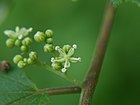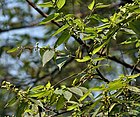Note: This is a project under development. The articles on this wiki are just being initiated and broadly incomplete. You can Help creating new pages.
Trema orientalis
Trema orientalis is a fast-growing, evergreen shrub or tree with a heavy branching and rounded to spreading crown, reaching a height of up to 18 metres. It has a short basally swollen bole that can be 60cm in diameter. The plant has a wide range of traditional uses for food, medicine and other commodities. A fast-growing tree, it has several applications in agroforestry as a shade tree, pioneer species etc.
Contents
[hide]- 1 Uses
- 2 Parts Used
- 3 Chemical Composition
- 4 Common names
- 5 Properties
- 6 Habit
- 7 Identification
- 8 List of Ayurvedic medicine in which the herb is used
- 9 Where to get the saplings
- 10 Mode of Propagation
- 11 How to plant/cultivate
- 12 Commonly seen growing in areas
- 13 Photo Gallery
- 14 References
- 15 External Links
Uses
Coughs, Sore throat, Asthma, Bronchitis, Gonorrhoea, Yellow fever, Toothache.[1]
Parts Used
Chemical Composition
Compounds present in the plant include tannins, saponins, flavanoids, triterpenes, phytosterols, and several constituents of xanthones.[2]
Common names
| Language | Common name |
|---|---|
| Kannada | ಗೋರ್ಕು Gorku, ಕರುಹಾಲೆ Karuhaale |
| Hindi | Gio, Jivan |
| Malayalam | Ratthi |
| Tamil | Yerralai |
| Telugu | Kakamushti |
| Marathi | Ghol |
| Gujarathi | |
| Punjabi | |
| Kashmiri | |
| Sanskrit | Jivani, Jivanti |
| English | Indian Charcoal Tree, Indian Nettle |
Properties
Reference: Dravya - Substance, Rasa - Taste, Guna - Qualities, Veerya - Potency, Vipaka - Post-digesion effect, Karma - Pharmacological activity, Prabhava - Therepeutics.
Dravya
Rasa
Guna
Veerya
Vipaka
Karma
Prabhava
Habit
Identification
Leaf
| Kind | Shape | Feature |
|---|---|---|
Flower
| Type | Size | Color and composition | Stamen | More information |
|---|---|---|---|---|
| {{{5}}} |
Fruit
| Type | Size | Mass | Appearance | Seeds | More information |
|---|---|---|---|---|---|
Other features
List of Ayurvedic medicine in which the herb is used
Where to get the saplings
Mode of Propagation
How to plant/cultivate
Charcoal tree is a plant of the lowland humid tropics, where it can be found at elevations from sea level up to 2,500 metres.[5]
Commonly seen growing in areas
Moist forests, Dry scrub of open slopes, Open places on hillsides.
Photo Gallery
References
- Jump up ↑ Indian Medicinal Plants by C.P.Khare
- Jump up ↑ Chemical constuents
- Jump up ↑ Common names
- Jump up ↑ [Morphology]
- Jump up ↑ Cultivation
External Links
- Ayurvedic Herbs known to be helpful to treat Coughs
- Ayurvedic Herbs known to be helpful to treat Sore throat
- Ayurvedic Herbs known to be helpful to treat Asthma
- Ayurvedic Herbs known to be helpful to treat Bronchitis
- Ayurvedic Herbs known to be helpful to treat Gonorrhoea
- Ayurvedic Herbs known to be helpful to treat Yellow fever
- Ayurvedic Herbs known to be helpful to treat Toothache
- Herbs with Leaves used in medicine
- Herbs with Fruits used in medicine
- Herbs with common name in Kannada
- Herbs with common name in Hindi
- Herbs with common name in Malayalam
- Herbs with common name in Tamil
- Herbs with common name in Telugu
- Herbs with common name in Marathi
- Herbs with common name in Sanskrit
- Herbs with common name in English
- Habit - Evergreen tree
- Index of Plants which can be propagated by Seeds
- Index of Plants which can be propagated by Cuttings
- Herbs that are commonly seen in the region of Moist forests
- Herbs that are commonly seen in the region of Dry scrub of open slopes
- Herbs that are commonly seen in the region of Open places on hillsides
- Herbs






